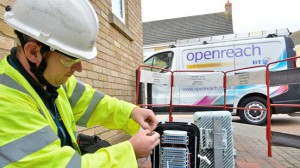
After more than 40 years of operation, DTVE is closing its doors and our website will no longer be updated daily. Thank you for all of your support.
BT sees TV growth, commits to G.Fast investment
 BT’s TV base grew by 66,000 in the first three months of the year, and by 28% year-on-year, to reach 1.5 million at the end of the company’s fourth financial quarter.
BT’s TV base grew by 66,000 in the first three months of the year, and by 28% year-on-year, to reach 1.5 million at the end of the company’s fourth financial quarter.
BT Sport’s average daily audience figures increased 45% year on year, from the start of the football season in August to the end of March, while its coverage of the Europa League match between Liverpool and Manchester Utd generated an audience of over two million viewers for the first time.
“Overall, this is a good set of results as BT Consumer continues to stand out with another strong quarter of subscriber and revenue growth compared to other segments, further reinforcing the benefits of acquiring EE. However, we are somewhat disappointed with the lack of more growth in TV, given the acquisition of key rights and the first to launch live TV in 4K, in the UK, said Paolo Pescatore, director, multiplay and media at analyst group CCS Insight.
“It has been a very pivotal year for the company; with a return to the consumer mobile market, the acquisition of EE and the exclusive destination for UEFA Champions League football. But the competitive and regulatory environment remains challenging; which the company still has to overcome. The significant investment in networks will go somewhere to appease regulators. This being said, BT and EE combined represent a formidable force to tap into the opportunities that exist in convergence for both business and consumer.”
BT also announced that it would increase its investment in G.Fast technology, with two trials of the copper-based technology, which can deliver internet speeds of up to 330Mbps, planned for this year. The company said that its Openreach and EE businesses will between them spend around £6 billion in capital expenditure over the next three years in the first phase of a plan to extend superfast broadband and 4G coverage beyond 95% of the country by 2020.
BT’s Openreach network arm added 415,000 fibre broadband customers in the final quarter, 9% fewer than in the same quarter last year, with third-party operators responsible for 48% of the new additions. BT’s own fibre broadband base reached 4.1 million at the end of March.
Broadband and TV revenue together grew by 17% compared with a revenue increase of 7% for BT Consumer overall, contributing to a 6% rise overall in revenue to £19 billion and a 15% rise in profits to just over £3 billion.
The TV growth follows three years of heavy investment in football rights by BT, including its three-year Champions League and Premier League deals and, most recently, its acquisition of FA Cup rights.
“This has been a landmark year for BT. We’ve completed our acquisition of EE, the UK’s best 4G mobile network provider, we’ve passed more than 25m premises with fibre and we’ve also delivered a strong financial performance. We’ve met our outlook with our main revenue measure up 2.0%, the best performance for more than seven years. Our profit before tax was up a healthy 9%,” said BT CEO Gavin Patterson.
“Customers want to be online wherever they are and we will be there for them. Our multi-billion pound investment plans will see both fibre and 4G reach 95% of the UK and we won’t stop there. The UK is a digital leader and our investment in ultrafast broadband will help it stay ahead.
BT’s announcement about its broadband investment produced mixed responses. Sky said that the investment plan showed the need for a split between BT and Openreach.
Andrew Griffith, Sky’s group chief operating officer and chief financial officer, said: “Today’s statement shows that BT continues to see copper as the basis of its network for 21st century Britain. Despite BT’s claims, it is clearer than ever that their plans for fibre to the premise (FTTP) broadband will bypass almost every existing UK home. This limited ambition has been dragged out of BT by the threat of regulatory action, demonstrating once again why an independent Openreach, free to raise its own long-term capital, is the best way for the UK to get the fibre network it needs.”


